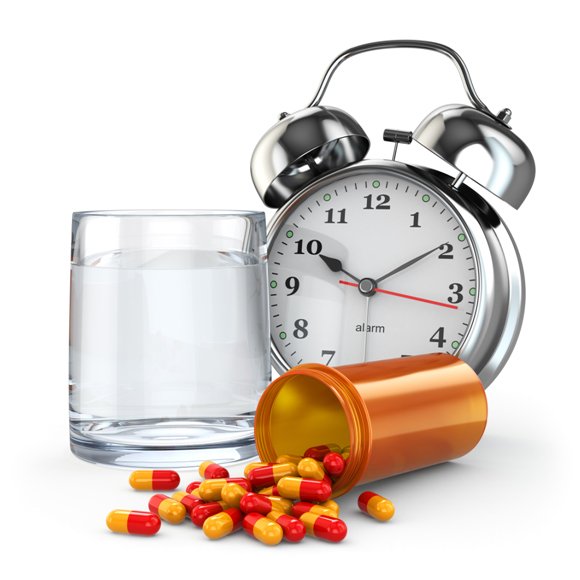Jenny suffers from Crohn’s disease, which gives her cramps and diarrhea. Six months ago, her diarrhea got so bad her rheumatologist started her on prednisone. Taking prednisone every day worked for her; the diarrhea and intestinal cramping went away, but there at a price.
Prednisone gave her a raging appetite, puffy cheeks, and bloating. As her weight kept increasing, her self confidence sank lower and lower. Every time she tried to cut down the amount of prednisone she took, her abdominal cramps and bloody diarrhea came roaring back.
Finally, she’d had enough. She called her specialist’s office and insisted her doctor do something. “Get me off the prednisone before I turn into the Incredible Hulk!”
Her doctor agreed. “Let’s try it a bit slower this time. First, we’ll move half of your prednisone dose to the evening.”
“But, I’m already taking my prednisone in the evening.”
“What? When did you start taking it in the evening?”
“I started out taking it in the morning, but it really upset my stomach, so I switched to taking with my dinner instead.”
“Hmmm…that could be why we couldn’t taper your prednisone down before.”
Once Jenny started taking her prednisone in the morning, she was able to taper her dose without any further problems with cramping or diarrhea.
“I never realized how taking medicine at a particular time could be important.”
Why did Jenny have such trouble tapering her prednisone?
Your body makes a vital hormone called cortisol, which is very similar to prednisone. Cortisol helps your body respond to stress and infection, and most of the time, your body makes a steady supply every day.
That changes when your body is under stress. Whenever you fight a serious infection, grapple with an emotionally challenging situation, or struggle with sleep deprivation, your body makes more cortisol, helping you respond to the crisis.
Prednisone is a type of cortisol. Jenny’s body reacted to prednisone by producing less cortisol because the prednisone made it look like she already had plenty. The higher the amount of prednisone Jenny consumed, the less cortisol her body made. When she decreased her prednisone dose, her body suddenly had much less cortisol, triggering diarrhea and intestinal cramps.
Taking her prednisone medicine in the morning decreased its negative effect on Jenny’s cortisol production. Tapering her prednisone dose became much more comfortable, and she was eventually successful at discontinuing it altogether. Today, Jenny smiles at the decreasing numbers she sees on her scale.
Are you taking your medicines at the BEST possible time?
Some medicines should be taken on an empty stomach to help you absorb the dose more thoroughly. In contrast, others are best taken with food to avoid stomach upset.
Here are 5 Tips for TakingYour Medicines at the Best Time:
- Clarify whether your medicine is affected by food.
If you are instructed to take medicine on an empty stomach, you should take it at least 30 minutes before eating or wait until 2-3 hours after a meal.
- Be flexible about medication administration times.
If you take the thyroid supplement medicine levothyroxine with food, you may not absorb the entire dose. Many people struggle to remember to take their levothyroxine in the morning before breakfast. If this is a challenge for you, take it at bedtime instead.
- When in doubt, take your medicine with food.
Most medicines should be taken with food to minimize stomach upset. In clinical trials where they keep track of every possible side effect, the most common side effect reported is stomach upset. Some antibiotics can cause nausea, cramps, and vomiting unless taken with food. The non-prescription pain medicines naproxen (Aleve®) and ibuprofen (Motrin®) are very irritating to the stomach. They cause stomach pain and bleeding unless taken diluted with food or a full glass of water.
- Some medicines are best taken at a specific time of the day.
Many cholesterol medicines are actually more potent if you take them late in the day. Drugs like lovastatin (Pravachol®) or simvastatin (Zocor®), called “statins,” are an example of this. “Statin” medicines work by blocking the last step needed for your liver to make cholesterol. Your liver makes most of its cholesterol at night. These medicines may further drop your cholesterol if you take them in the evening or at bedtime.
The stomach acid-blocking medicine omeprazole works best if you take it in the morning, about 30 minutes before breakfast.
- Take any “Water pills” or “Pee pills” early in the day.
Diuretics that trigger increased urination should be taken in the morning. Most people find that it’s smart to delay taking “water pills” until after you return home from doing your errands.
If you must take a diuretic twice a day, take the second dose as early as possible, either at noon or by 3 pm in the afternoon. That way, you won’t be as likely to get up several times a night to urinate.


